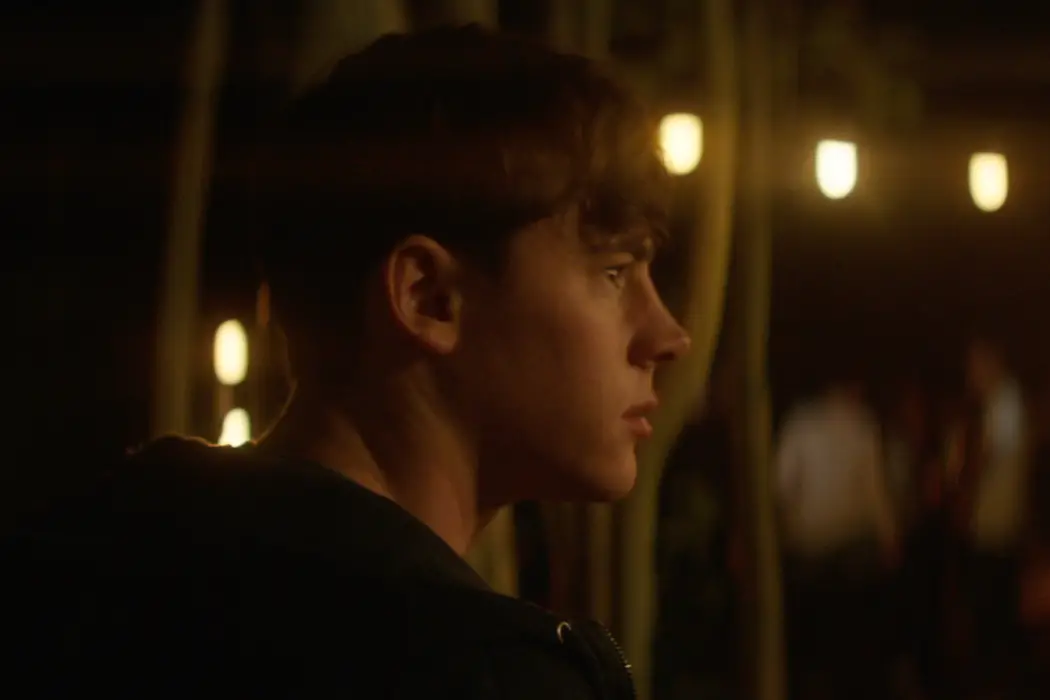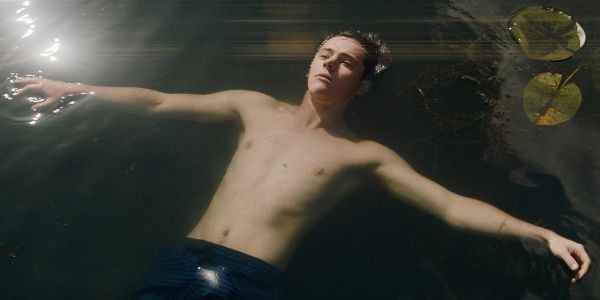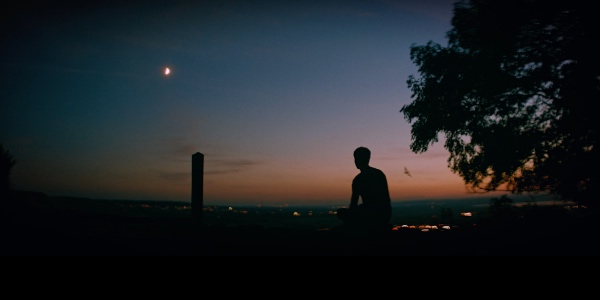PHILOPHOBIA: Juggling The Competing Affections Of Love, Leisure & Potent Drama

Tynan loves nagging all his friends to watch classic movies…
Philophobia positions itself as a movie indebted to words. Our protagonist, after all, is an aspiring writer whose favorite pastimes include circling words in a pocket dictionary — to ruminate over and store away for future use. But they serve a double purpose. They help in telling this narrative from up-and-coming director Guy Davies. Because, by definition, Philophobia is “the fear of falling in love,” and what better place to begin a story of youth.
There you have the seat of all coming-of-age stories introduced in the opening title and ensuing images. As timid Kai (Joshua Glenister) looks out his window, he catches a glimpse of his neighbor Grace (Kim Spearman), across the street, in a state of undress. The ambiguities of their relationship will form the crux of the drama and in these opening voyeuristic moments, I couldn’t help but think of Kieslowski‘s A Short Film About Love.
In the earlier picture, the reclusive protagonist is similarly fascinated with watching a woman across the way, even as he’s invariably naive and vulnerable. The same might be said of Philophobia. Because when the fantasy and the observer actually enter reality, say at school or a party, they must come in contact with the messiness of real-life, replete with warring emotions and mixed signals.
Words, Romance, and Friendship
Philophobia is a film where words are meant to have stories unto their own with connotations and nuggets of meaning buried within. That’s the pledge anyway. And yet it exerts itself, being about far more than fear, falling in love, and the intersection of the two.
If nothing else, we are reminded that coming-of-age stories have a set of well-worn conventions and pervasive undercurrents. They share a form and a language we can all relate to and can easily imprint our experiences on. Stop me if you’ve heard this before. It’s one week before the rest of our lives. Each of us is intent on shaking the dust of our two-bit town and getting out into the world to live a little. Feeling trapped is the ultimate fear.

Kai’s of that time-honored tradition, the wide-eyed literarian who conveniently doubles as our everyman. There’s the resident jerk, brunette and blonde tropes, and the cool teacher who gives his own subtle inflections of “carpe diem.” In an early scene, when he pointedly tells his star pupil to “write what you know” the words have almost self-reflexive significance.
You can see Davies and his co-collaborator Mathew Brawley have taken these words to heart quite literally. They have a familiarity with their world allowing them to handle it with care — to find the humor and unearth the drama, while still playing true to where they’re from. And this is only an inclination, I’ve never been in Stroud, but I have a feeling, even an inkling, of what it might be like.
Philophobia also manages to layer a lot over its furtive romance, whether it’s lifelong friendships or even relationships with parents, only touched on for moments at a time. But it gives us more to mull over because, at its best, it is a movie of adequate leisure. I mean it in the sense that allowances are made for shooting the breeze in an old, beat-up lounge chair or sprawled out on a rooftop taking drags from an illicit joint. The beauty of these scenarios is simplicity itself. All you need are a couple of buddies and you’re in for a fairly absorbing time. At any rate, it feels authentic.
But we have yet to mention the buddies, and a film like this would be amiss without them. Megsy (Jack Gouldbourne) is the likable if profane clown of the group who stretches out his sentences to every syllable with his high-pitched brogue always getting a good laugh. He’s more than capable with a few genuinely hilarious shenanigans. One involving a gun and an upstairs window springs to mind. Then there’s ever-reliable Sammy (Charlie Frances) always glowing with a goofy smile and a twinkle in his eye.

Around the dining hall table, they deliberate over their premediated senior pranks. It’s one of the few truly suspect directorial decisions as a flamboyant Tarantino-like spin sends us whirling around the table of lads again and again in dizzying repetition. The majority of the movie is far more actionable, and as a result, more interesting.
Take any number of moments. Nearly getting caught by the cops for smoking. Attending parties proliferated by bumping music, booze, and, of course, make-out sessions. There are backflips into the lake and near-death experiences. So Philophobia remains fairly jovial and adolescent until it’s not…
Ensuing Drama
Buried hurts are normally concealed behind closed doors and drawn window shades but again, as the audience, we are privy to the characters in their most personal moments of anxiety and confusion. In one unnerving yet on-point moment, Kai circles the word “disquiet” in red underscoring what the scene is trying to get at.
And on numerous occasions, the film looks to keep up this tension — this dread — as if this will keep the audience around to witness some imminent trauma. We’re never allowed to get overly comfortable because there is this persistent sinking feeling welling up inside. Most of the time it works quite well. However, I’m inclined to think Philophobia is at its very best in the subdued even jocular moments cast under soft hues and lens flares.

Because the turbulence, though well-founded for a teen movie, threatens to derail what feels distinctly real. The two characters who probably receive the shortest end of the stick are the fractured object of desire, Grace, and her hulking boyfriend Kenner (Alexander Lincoln).
It’s a testament to both that there are isolated moments where we are allowed the license to feel for them and to believe there is something more substantive to them than surface-level tropes. Even as Kai’s romantic forays are trivialized as life experience and fodder for his future literary career and then Kenner increasingly burns with vindictive rage, the contours are just enough to keep us questioning.
Meanwhile, the lads manage to become legends in their own time with an army of purloined forks erected on the school grounds to go with a good ol’ fashioned exhibition in streaking, during the wee hours of the morning.
Philophobia: Final Thoughts
Given the ample time allotted, it’s easy to call the pacing into question, between the will-they-won’t they romance and all the interludes in between. Is it too much drama? Is it not enough? I’m not sure. To a degree, it feels like scenes are being strung together, but as we’re given some pretense of finality — school being done with — and we genuinely enjoy the company of our leads, it doesn’t seem to matter much.
There’s also an underlying sense it lacks a cohesive finale and maybe that’s more indicative of the stage in life than the strength of the story. Likewise, the individual words themselves don’t pack as much meaning as they’re meant too. But one of the saving graces of Film is how, sometimes, images can be enough.
Story is important and conflict and structure, but what I’m reminded of most are the asides. Sometimes coming-of-age tales focus too much on the momentous occasions. It’s the banalities matched with the foolhardy escapades that color what it’s really like.
So I’m tempted to forego Philophobia‘s attempt at perplexing headiness and enjoy its other charms instead. Because while it’s not able to fully articulate its myriad of ideas, at least it’s brave enough to extend itself and to be something of its own creation, albeit heavily borrowed from the teen comedies and dramas of the past. Still, there’s no harm in that.
Do you think the maxim “write what you know” holds true for screenwriting & filmmaking? Let us know your thoughts in the comments below!
Watch Philophobia
Does content like this matter to you?
Become a Member and support film journalism. Unlock access to all of Film Inquiry`s great articles. Join a community of like-minded readers who are passionate about cinema - get access to our private members Network, give back to independent filmmakers, and more.
Tynan loves nagging all his friends to watch classic movies with him. Follow his frequent musings at Film Inquiry and on his blog 4 Star Films. Soli Deo Gloria.













